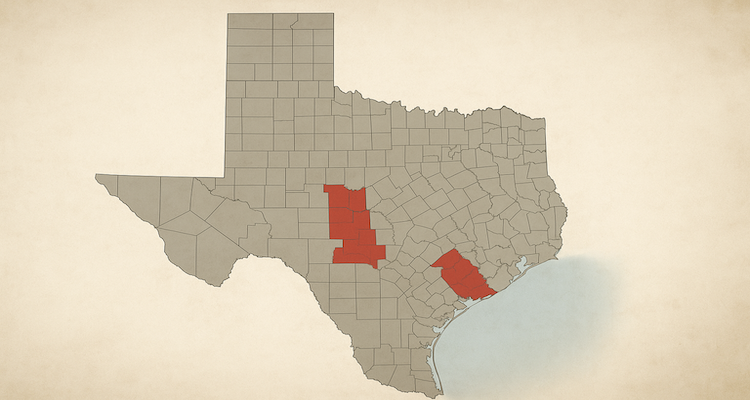Texas Redistricting Plan Halted in Major Court Blow

A federal court blocks Texas’ new congressional map, ruling it was racially gerrymandered. The decision derails GOP efforts ahead of the 2026 elections.
A High-Stakes Political Map Meets a Legal Wall
A sweeping attempt by Texas leaders to reshape the state’s political landscape ahead of the 2026 midterms has hit a major roadblock. A federal judicial panel has halted a new congressional map designed to help Republicans seize multiple Democratic-held seats, ruling that state officials crossed a constitutional line by basing the map on race. The decision instantly reshapes the national redistricting fight and threatens GOP efforts to expand their razor-thin majority in the U.S. House of Representatives.
How Texas’ New Map Became a Political Flashpoint
Texas has long been a battleground in the national redistricting wars, but this round carried unusual political pressure. Republican Governor Greg Abbott pushed state lawmakers to redraw congressional boundaries after receiving pressure from former President Donald Trump, who urged GOP-led states to lock in as many safe Republican seats as possible.
Under the 2021 map currently in effect, Republicans hold 25 of Texas’ 38 U.S. House districts. GOP lawmakers argued a redesigned map could flip up to five Democratic seats, potentially securing a more durable Republican edge heading into future elections. Trump’s allies viewed Texas as a crucial lever in maintaining the party’s tenuous 219–214 House majority.
But civil rights groups warned that the new proposal would significantly diminish political representation for Black and Hispanic voters, who have driven much of the state’s population growth. Their challenge would ultimately set the stage for a legal battle with national implications.
Judges Say Texas Crossed a Constitutional Line
On Tuesday, a three-judge panel from the U.S. District Court for the Western District of Texas ruled 2–1 to block the new map from taking effect. The panel ordered the state to instead use its existing 2021 congressional boundaries in next year’s elections.
Judge Jeffrey Brown appointed by Trump in 2019, authored the majority opinion, writing that “substantial evidence shows” the new map was drawn with racial considerations at its core, violating federal protections against racial discrimination in voting. Judge David Guaderrama, appointed by former President Barack Obama, joined the opinion. Judge Jerry Smith, a Reagan appointee, dissented.
The ruling found that Governor Abbott “explicitly directed the Legislature to redistrict based on race,” citing instructions he issued after the Trump-era Justice Department warned the state to act or face legal consequences. The judges determined that the DOJ’s warning itself was rooted in a “legally incorrect assertion,” raising further concern over the legitimacy of the process that followed.
The court concluded that the resulting map infringed on constitutional guarantees of equal protection by packing minority voters into certain districts and carving them out of others.
Texas immediately filed notice of appeal to the U.S. Supreme Court, and Abbott called the decision “absurd,” signaling a protracted legal fight ahead.
Civil Rights Groups Celebrate, GOP Defends Plan
Civil rights organizations who spearheaded the challenge hailed the decision as a win for minority voters across the state.
The NAACP noted in a statement that, despite Texas being “only 40% white,” white voters control more than 73% of its congressional seats, an imbalance they argue is reinforced by maps like the one struck down.
Gloria Leal, an attorney representing the League of United Latin American Citizens (LULAC), said the rejected map “corralled minority voters into certain districts while stripping them from others,” creating fewer opportunities for Hispanic and Black communities to elect candidates of their choice. Even if the motive was political, she said, the effect amounted to racial gerrymandering, still illegal under U.S. law.
State leaders, however, forcefully rejected those claims. Abbott said the suggestion that the maps discriminated based on race “makes no sense,” while Texas Attorney General Pamela Bondi insisted the lines were crafted “the right way for the right reasons.” Both vowed to pursue the fight at the Supreme Court.
A Ripple Effect Across Red and Blue States
The Texas ruling lands as both parties wage an intensifying national struggle over redistricting. In recent weeks:
-
Indiana Republicans scrapped a special session meant to pass a new GOP-friendly map after internal disagreements.
-
California Democrats, responding directly to Texas’ actions, advanced a plan aimed at tipping at least five Republican-held districts. Voters approved the new map in November, prompting the Trump administration to file a lawsuit seeking to block it.
-
Virginia has moved forward on its own map overhaul, potentially giving Democrats additional advantages.
If the Texas ruling stands, it could shift momentum toward Democrats in the broader fight over congressional representation. With only a handful of competitive seats likely to determine House control in 2026, even a single blocked map or a single flipped district, could alter the national political balance.
The case also underscores the legal tightrope states walk: while the U.S. Supreme Court has barred federal courts from policing partisan gerrymandering, racial gerrymandering remains unlawful. Tuesday’s ruling clarifies that states cannot defend racial line-drawing as a political strategy, even if partisan gain is the ultimate goal.
A Critical Turning Point With National Stakes
Texas’ halted map is more than a state-level setback, it’s a pivotal moment in a nationwide redistricting confrontation. As Republicans and Democrats brace for a high-stakes 2026 election cycle, the fight over how political power is drawn on paper may prove just as consequential as the campaigns themselves. Whether the Supreme Court takes up the case, and how it rules, could reshape not only Texas’ political landscape but the broader rules governing American democracy.
ALSO READ: Trump Defends Prince Salman Over Khashoggi Killing During High-Profile White House Visit








